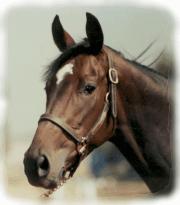
A Horse, of Course with Don Blazer |

Genetics Versus Environment By Don Blazer copyright©2016 If you’re going to breed horses, raise them and train them, then you’re significantly more important than the genetics involved. Yes, you! The greatest value derived from the study of genetics may be the jolting of the student from the world of dreams and into reality. Everyone dreams of breeding a winner; the reality is few do. Most breeders study bloodlines (mares and stallions), nicks, crosses, conformation, and competition records, yet seldom give consideration to the resulting foal’s environment, and that is why they fail so often. (One champion for every 20,000 foals.) Genetics, the science of heredity, is not exact and not controllable. Heredity is only the tendency of like to beget like. The key word is “tendency.” Without going into details, accept the fact that genes contain coded information that determines exactly what job each gene will perform. Some genes build eyes, some the hoof, some the skin and hair, others the organs and still others the horse’s color. They give the horse his traits, including his ability to work cattle, run fast, animated movement and even disposition and temperament. But genes are ornery, and often don’t do the same thing. Genes have “variable expressivity.” This is seen in the fact all chestnut horses are not the same color of chestnut…..some are lighter, darker, redder, or less bright. Knowing that genes act in different ways under different circumstances, we apply the laws of probability. The laws of probability say if the mare and sire of Secretariat were mated again the chances of getting another Secretariat are greater than if you mate two other horses trying to get another Secretariat. And while the laws of probability will work out, it often takes a hundred years or more. A better approach to breeding champions is to concern yourself with “quantitative genes” rather than “qualitative genes.” Qualitative genes act the same in every situation; the bay color gene always produces the color bay, so don’t worry about it. Quantitative genes, on the other hand, determine things such as size, vigor, growth-rate, conformation, speed, intelligence and even cow sense. And it’s been determined 60% of a horse’s abilities come from quantitative genes. The two great things about quantitative genes are that they determine the things which make champions, and they can be influenced by outside forces—the foal’s environment. Get the picture? You can control the foal’s environment! If you are going to breed the horse, raise the horse and train the horse, your priority concern should be to provide the environment needed so the quantitative genes are properly influenced to produce a superior horse. Pick a mare with a proven record of success at a particular event, mate her with a stallion which has a proven record of success at a particular event, and then cross your fingers because if you don’t provide the proper environment, all you’ve got going for you is luck. The smartest and most successful breeders pick the best mares and mate them to the best stallion they can afford….then they do the real work of producing champions. They study nutrition and learn the best feeds for the foal and the type of body he’ll need for the work he’ll eventually do. They provide the foal with the room to play and they understand the affect the weather is going to have on the foal as he grows. They plan the foal’s exercise program, and they make sure the foal is handled and trained properly from day one. This takes study…this takes some talent…this takes more than most are willing to give. Love and kisses, hopes and dreams don’t make champions. Taking the responsibility to provide what the foal needs results in success, because when all is said and done, you are more important than the genetics involved. * Earn a degree in equine studies, or certification as a horse trainer, riding instructor or stable manager. Go to www.horsecoursesonline.com for more information. Each month you'll find a new column on our web site. We hope you'll enjoy it, and maybe e-mail us with questions or suggestions for other columns. A Horse, Of Course is a monthly column syndicated by Success Is Easy. If you like the column, call your local newspaper, or local horse publication and ask them to subscribe by contacting Success Is Easy. |